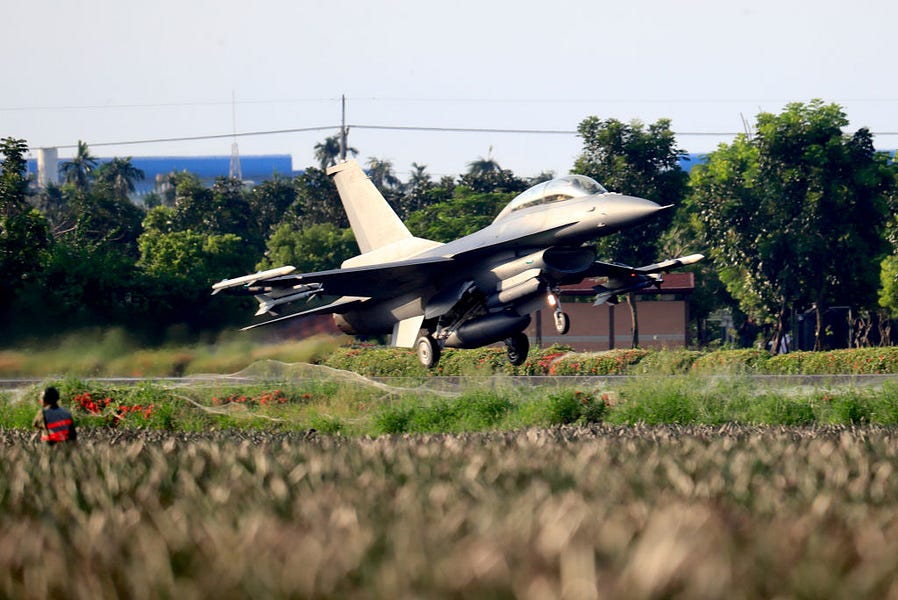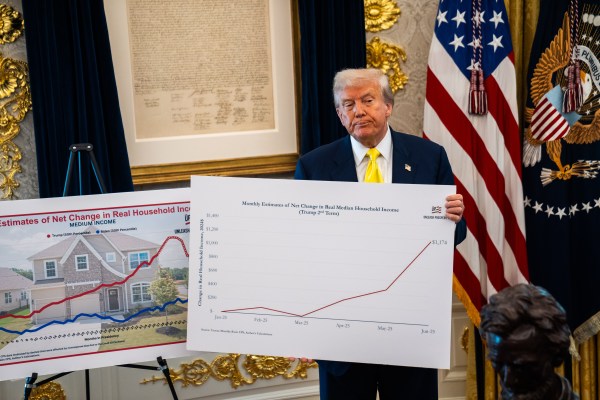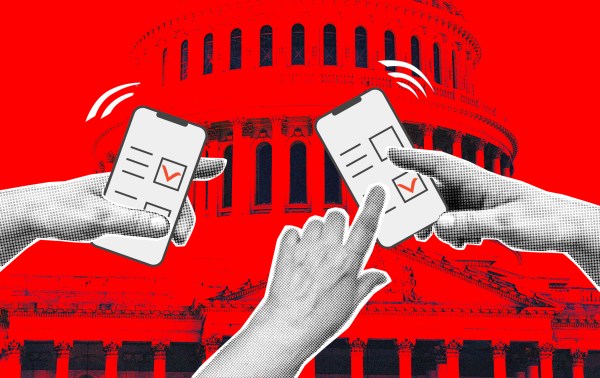President Joe Biden said over the weekend that the U.S. military would defend Taiwan if it faced an “unprecedented attack” by China. White House officials quickly claimed that there has been no official change in policy, but this is the fourth time Biden has made such comments since taking office.
Is the policy of “strategic ambiguity” over? If so, what does that mean for the world’s most important bilateral relationship?
What Is Strategic Ambiguity?
The Chinese Civil War ended in 1949 with a communist victory and the establishment of the People’s Republic of China (PRC). The nationalist leaders of the Republic of China (ROC) fled to the island of Taiwan.
For 30 years the U.S. recognized the ROC in Taiwan as the legitimate government of China, but President Richard Nixon’s 1972 visit to the mainland started the process of normalizing relations with the PRC. Seven years later, the U.S. formally recognized the PRC while abrogating a mutual defense treaty with the ROC and severing formal diplomatic ties with its government.
“The United States didn’t want to completely abandon Taiwan,” Patrick Cronin, the Asia-Pacific security chair at the Hudson Institute, said in an interview. Therefore, American policy has been to foster “strategic ambiguity” about the circumstances in which the U.S. might intervene on Taiwan’s behalf in a war between the island and the mainland.
“Strategic ambiguity is an attempt to avoid making unmistakable commitments that would have a downside while still getting the benefits of an implied commitment,” Peter Feaver, a political science professor at Duke University, told The Dispatch.
The One-China Policy
In the 1970s, the PRC and ROC each claimed there was one China but disagreed about which government was legitimate. For decades, China lacked the military capability to successfully invade the island, making overreach by Taiwan a greater concern for U.S. policymakers. But today China appears to be the aggressor with frequent air incursions over Taiwanese territory and a larger Navy. The majority of Taiwanese, meanwhile, prefer to maintain the status quo.
The U.S. still maintains the “One-China policy” that emerged from Nixon’s visit 50 years ago. “The United States acknowledges that all Chinese on either side of the Taiwan Strait maintain there is but one China and that Taiwan is a part of China,” the 1972 Shanghai Communiqué says. “The United States Government does not challenge that position.”
Adding to the confusion, the PRC’s view that Taiwan is a part of China is often referred to as the “One-China principle.” The United States’ “One-China policy” is to acknowledge that principle but not necessarily to endorse it.
Is Biden Changing U.S. Policy?
Strategic ambiguity has been the foundation of U.S. policy for decades, and the White House continues to insist it hasn’t changed. But four “misstatements” suggest a pattern.
It’s up for debate whether this is a subtle way of shifting away from strategic ambiguity or merely Biden doing something he has done for decades—misspeaking during interviews.
“There is still plenty of ambiguity when it comes to exactly how the United States would react if China used force,” Mike Mazza, an American Enterprise Institute fellow, told The Dispatch. “But, at least as long as Joe Biden remains president, there is less ambiguity than before.” Cronin concurs, casting Biden’s comments as a continuation of a trend toward “strategic clarity” over the past six years, even as the U.S. still retains some “tactical ambiguity.”
What Is the Role of Congress?
“As a practical matter, virtually nothing would have to be approved by Congress for a president to get us into war” in the Taiwan Strait, Cronin said. But Capitol Hill also plays a role in shaping American foreign policy, and historically it has approached Taiwan differently than the White House.
When the U.S. ended formal relations with Taiwan in 1979 and entered what the State Department calls “a robust unofficial relationship,” Congress passed and President Jimmy Carter signed the Taiwan Relations Act, which commits the United States to providing arms to Taiwan for its self-defense. The TRA has long had strong bipartisan support. Congress is now considering a new Taiwan Policy Act to supplement the TRA, reassure Taiwan and more forcefully deter the threat of a Chinese invasion.
“If you’re in Congress, your position is to protect Taiwan,” Cronin said. The White House position—across multiple administrations of both parties—has been not only to try to protect Taiwan but also “to try to look after our interests with the Big Power in Beijing.”
What Would the End of Strategic Ambiguity Mean?
Ending strategic ambiguity wouldn’t necessarily make war more likely. Reducing Chinese President Xi Jinping’s doubt about American intentions and pursuing a “more coordinated, integrated approach to defending Taiwan” could “contribute to more effective deterrence,” Mazza said.
But it’s not as simple as rhetoric. “If a clear commitment to defend Taiwan is not matched by the capacity to do so, that will heighten the risk that China opts to use force,” he added.
Military, economic, and diplomatic factors—which Congress and the president determine—will matter more. “Currently, the Biden administration talks about the Taiwan Strait as if Taiwan faces an increasingly urgent threat,” Mazza said. “Curiously, however, the administration is acting with little actual urgency.”
Tensions will likely remain high, as the recent controversy regarding House Speaker Nancy Pelosi’s trip to Taiwan demonstrated. Cronin said that “this strategic ambiguity question is getting very uncomfortable as China gets more assertive in wanting to move towards unification—what they would call reunification.”






Please note that we at The Dispatch hold ourselves, our work, and our commenters to a higher standard than other places on the internet. We welcome comments that foster genuine debate or discussion—including comments critical of us or our work—but responses that include ad hominem attacks on fellow Dispatch members or are intended to stoke fear and anger may be moderated.
With your membership, you only have the ability to comment on The Morning Dispatch articles. Consider upgrading to join the conversation everywhere.